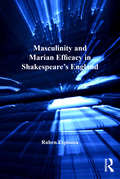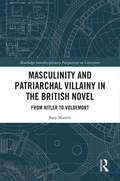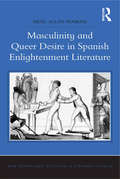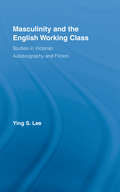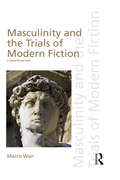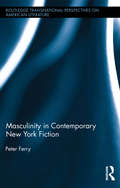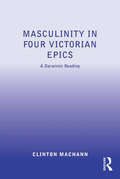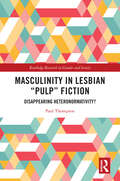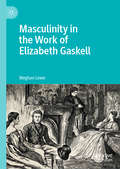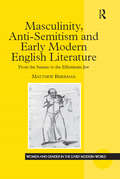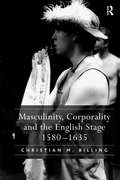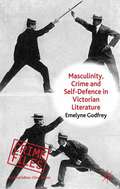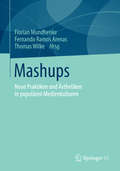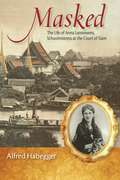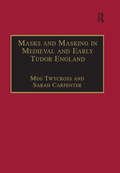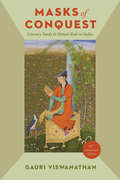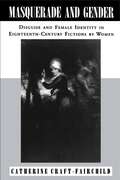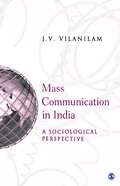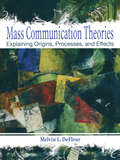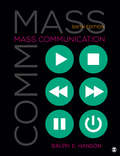- Table View
- List View
Masculinity and Marian Efficacy in Shakespeare's England (Women and Gender in the Early Modern World)
by Ruben EspinosaMasculinity and Marian Efficacy in Shakespeare's England offers a new approach to evaluating the psychological 'loss' of the Virgin Mary in post-Reformation England by illustrating how, in the wake of Mary's demotion, re-inscriptions of her roles and meanings only proliferated, seizing hold of national imagination and resulting in new configurations of masculinity. The author surveys the early modern cultural and literary response to Mary's marginalization, and argues that Shakespeare employs both Roman Catholic and post-Reformation views of Marian strength not only to scrutinize cultural perceptions of masculinity, but also to offer his audience new avenues of exploring both religious and gendered subjectivity. By deploying Mary's symbolic valence to infuse certain characters, and dramatic situations with feminine potency, Espinosa analyzes how Shakespeare draws attention to the Virgin Mary as an alternative to an otherwise unilaterally masculine outlook on salvation and gendered identity formation.
Masculinity and Patriarchal Villainy in the British Novel: From Hitler to Voldemort (Routledge Interdisciplinary Perspectives on Literature)
by Sara MartínMasculinity and Patriarchal Villainy in the British Novel: From Hitler to Voldemort sits at the intersection of literary studies and masculinity studies, arguing that the villain, in many works of contemporary British fiction, is a patriarchal figure that embodies an excess of patriarchal power that needs to be controlled by the hero. The villains' stories are enactments of empowerment fantasies and cautionary tales against abusing patriarchal power. While providing readers with in-depth studies of some of the most popular contemporary fiction villans, Sara Martín shows how current representations of the villain are not only measured against previous literary characters but also against the real-life figure of the archvillain Adolf Hitler.
Masculinity and Queer Desire in Spanish Enlightenment Literature (New Hispanisms: Cultural and Literary Studies)
by Mehl Allan PenroseIn Masculinity and Queer Desire in Spanish Enlightenment Literature, Mehl Allan Penrose examines three distinct male figures, each of which was represented as the Other in eighteenth- and early nineteenth-century Spanish literature. The most common configuration of non-normative men was the petimetre, an effeminate, Francophile male who figured a failed masculinity, a dubious sexuality, and an invasive French cultural presence. Also inscribed within cultural discourse were the bujarrón or ’sodomite,’ who participates in sexual relations with men, and the Arcadian shepherd, who expresses his desire for other males and who takes on agency as the voice of homoerotica. Analyzing journalistic essays, poetry, and drama, Penrose shows that Spanish authors employed queer images of men to engage debates about how males should appear, speak, and behave and whom they should love in order to be considered ’real’ Spaniards. Penrose interrogates works by a wide range of writers, including Luis Cañuelo, Ramón de la Cruz, and Félix MarÃa de Samaniego, arguing that the tropes created by these authors solidified the gender and sexual binary and defined and described what a ’queer’ man was in the Spanish collective imaginary. Masculinity and Queer Desire engages with current cultural, historical, and theoretical scholarship to propose the notion that the idea of queerness in gender and sexuality based on identifiable criteria started in Spain long before the medical concept of the ’homosexual’ was created around 1870.
Masculinity and the English Working Class: Studies in Victorian Autobiography and Fiction (Literary Criticism and Cultural Theory)
by Ying LeeThis book examines representations of working-class masculine subjectivity in Victorian autobiography and fiction. In it, Ying focuses on ideas of domesticity and the male body and demonstrates that working-class masculinities differ substantially from those of the widely studied upper classes. The book also maps the relationship between two trends: the early nineteenth-century efflorescence of published working-class autobiographies (in which working men construct their identities for a broad readership); and a contemporaneous surge of public interest in "the lower orders" that finds reflection in the depiction of working-class characters in popular novels by middle-class authors. The book mimics this point of convergence by pairing three working-class autobiographies with three middle-class novels. Each chapter focuses on a particular type of work: domestic service, manual (not artisanal) labour, and literary labour (and the opportunities it offers for social advancement). Ying considers the specific ways in which classed and gendered consciousness emerges autobiographically and its significance in the writing of working-class subjectivity for public consumption. Then mainstream novels by Charles Dickens, Elizabeth Gaskell and Charles Kingsley are re-read from the perspective of these autobiographical pressure points.
Masculinity and the New Imperialism
by Bradley DeaneAt the end of the nineteenth century, the zenith of its imperial chauvinism and jingoistic fervour, Britain's empire was bolstered by a surprising new ideal of manliness, one that seemed less English than foreign, less concerned with moral development than perpetual competition, less civilized than savage. This study examines the revision of manly ideals in relation to an ideological upheaval whereby the liberal imperialism of Gladstone was eclipsed by the New Imperialism of Disraeli and his successors. Analyzing such popular genres as lost world novels, school stories, and early science fiction, it charts the decline of mid-century ideals of manly self-control and the rise of new dreams of gamesmanship and frank brutality. It reveals, moreover, the dependence of imperial masculinity on real and imagined exchanges between men of different nations and races, so that visions of hybrid masculinities and honorable rivalries energized Britain's sense of its New Imperialist destiny.
Masculinity and the Trials of Modern Fiction
by Marco WanHow do lawyers, judges and jurors read novels? And what is at stake when literature and law confront each other in the courtroom? Nineteenth-century England and France are remembered for their active legal prosecution of literature, and this book examines the ways in which five novels were interpreted in the courtroom: Gustave Flaubert’s Madame Bovary, Paul Bonnetain’s Charlot s’amuse, Henry Vizetelly’s English translation of Émile Zola’s La Terre, Oscar Wilde’s The Picture of Dorian Gray and Radclyffe Hall’s The Well of Loneliness. It argues that each of these novels attracted legal censure because they presented figures of sexual dissidence – the androgyne, the onanist or masturbator, the patricide, the homosexual and the lesbian – that called into question an increasingly fragile normative, middleclass masculinity. Offering close readings of the novels themselves, and of legal material from the proceedings, such as the trial transcripts and judicial opinions, the book addresses both the doctrinal dimensions of Victorian obscenity and censorship, as well as the reading practices at work in the courtroom. It situates the cases in their historical context, and highlights how each trial constitutes a scene of reading – an encounter between literature and the law – through which different forms of masculinity were shaped, bolstered or challenged.
Masculinity in Contemporary New York Fiction (Routledge Transnational Perspectives on American Literature)
by Peter FerryMasculinity in Contemporary New York Fiction is an interdisciplinary study that presents masculinity as a key thematic concern in contemporary New York fiction. This study argues that New York authors do not simply depict masculinity as a social and historical construction but seek to challenge the archetypal ideals of masculinity by writing counter-hegemonic narratives. Gendering canonical New York writers, namely Paul Auster, Bret Easton Ellis, and Don DeLillo, illustrates how explorations of masculinity are tied into the principal themes that have defined the American novel from its very beginning. The themes that feature in this study include the role of the novel in American society; the individual and (urban) society; the journey from innocence to awareness (of masculinity); the archetypal image of the absent and/or patriarchal father; the impact of homosocial relations on the everyday performance of masculinity; male sexuality; and the male individual and globalization. What connects these contemporary New York writers is their employment of the one of the great figures in the history of literature: the flâneur. These authors take the flâneur from the shadows of the Manhattan streets and elevate this figure to the role of self-reflexive agent of male subjectivity through which they write counter-hegemonic narratives of masculinity. This book is an essential reference for those with an interest in gender studies and contemporary American fiction.
Masculinity in Four Victorian Epics: A Darwinist Reading
by Clinton MachannOffering provocative readings of Tennyson's Idylls of the King, Barrett Browning's Aurora Leigh, Clough's Amours de Voyage, and Browning's The Ring and the Book, Clinton Machann brings to bear the ideas and methods of literary Darwinism to shed light on the central issue of masculinity in the Victorian epic. This critical approach enables Machann to take advantage of important research in evolutionary psychology, cognitive science, anthropology, among other scientific fields, and to bring the concept of human nature into his discussions of the poems. The importance of the Victorian long poem as a literary genre is reviewed in the introduction, followed by transformative close readings of the poems that engage with questions of gender, particularly representations of masculinity and the prevalence of male violence. Machann contextualizes his reading within the poets' views on social, philosophical, and religious issues, arguing that the impulses, drives, and tendencies of human nature, as well as the historical and cultural context, influenced the writing and thus must inform the interpretation of the Victorian epic.
Masculinity in Lesbian “Pulp” Fiction: Disappearing Heteronormativity? (Routledge Research in Gender and Society)
by Paul ThompsonThis book looks specifically and in depth, for the first time, at masculinity in cheap, lesbian-themed paperbacks of the two decades after WW2. It challenges established critical assumptions about the readership, and sets the masculinity imagined in these novels against the “masculinity crisis” of the era in which they were written.The key issue of these novels is couplehood as much as sexuality, and the instability of masculinity leads to the instability of the couple. Thompson coins the term “heteroemulative” to describe the struggle that both heterosexual and homosexual couples have in conforming to heteronormativity.As several of these novels have been republished and remain in print, they have taken on a new relevance to issues of sexuality and gender in the twentyfirst century, and this study will attract readers within that area of interest. A valuable read for sociologists studying gender roles, and social historians of the cold war period in the United States. It is suitable for readers of all academic levels, from undergraduate, through postgraduate, to scholars and researchers, but also for a general readership.
Masculinity in Transition
by K. Allison HammerLocating the roots of toxic masculinity and finding its displacement in unruly culture Masculinity in Transition analyzes shifting relationships to masculinity in canonical works of twentieth-century literature and film, as well as in twenty-first-century media, performance, and transgender poetics. Focusing on &“toxic masculinity,&” which has assumed new valence since 2016, K. Allison Hammer traces its roots to a complex set of ideologies embedded in the histories of settler colonialism, racial capitalism, and political fraternity, and finds that while toxic strains of masculinity are mainly associated with straight, white men, trans and queer masculinities can be implicated in these systems of power. Hammer argues, however, that these malignant forms of masculinity are not fixed and can be displaced by &“unruly alliances&”—texts and relationships that reject the nationalisms and gender politics of white male hegemony and perform an urgently needed reimagining of what it means to be masculine. Locating these unruly alliances in the writings, performances, and films of butch lesbians, gay men, cisgender femmes, and trans and nonbinary individuals, Masculinity in Transition works through an archive of works of performance art, trans poetics, Western films and streaming media, global creative responses to HIV/AIDS, and working-class and &“white trash&” fictions about labor and unionization. Masculinity in Transition moves the study of masculinity away from an overriding preoccupation with cisnormativity, whiteness, and heteronormativity, and toward a wider and more generative range of embodiments, identifications, and ideologies. Hammer&’s bold rethinking of masculinity and its potentially toxic effects lays bare the underlying fragility of normative masculinity. Retail e-book files for this title are screen-reader friendly with images accompanied by short alt text and/or extended descriptions.
Masculinity in the Work of Elizabeth Gaskell
by Meghan LoweThis book is the first full-length study to focus on the representation of masculinity in Elizabeth Gaskell’s novels. In examining Gaskell’s understanding of masculine identity as a social construct and considering how her writing engages with Victorian ideologies of gender, this book demonstrates that Gaskell defies an essentialist approach to gender and instead explores masculinity over time, genre, region, and class, making it clear that masculinity is not monolithic but relational, culturally constructed, and dependent on many contexts. It analyses Gaskell’s depiction of what it means to be a ‘man’ and a ‘gentleman’, exploring Mary Barton, North and South, Ruth, Cousin Phillis, Sylvia’s Lovers, and Wives and Daughters, as well as contemporary Victorian works and key contexts such as sympathy, historic change, and industrialism. The target audiences are academics, as well as undergraduate and postgraduate students and research specialists, and it will most appeal to Victorian Literature, Gender Studies, and Masculinity Studies disciplines.
Masculinity, Anti-Semitism and Early Modern English Literature: From the Satanic to the Effeminate Jew (Women and Gender in the Early Modern World)
by Matthew BibermanOffering a profound re-assessment of the conceptual, rhetorical, and cultural intersections among sexuality, race and religion in English Renaissance texts, this study argues that antisemitism is a by-product of tensions between received Classical conceptions of masculinity and Christianity's strident critique of that ideal. Utilizing works by Shakespeare, Milton, Marlowe and others, Biberman illustrates how modern antisemitism develops as a way to stigmatize hypermasculine behavior, thus facilitating the transformation of the culture's gender ideal from knight to businessman. Subsequently, the function of antisemitism changes, becoming instead the mark of effeminate behavior. Consequently, the central antisemitic image changes from Jew-Devil to Jew-Sissy. Biberman traces this shift's repercussions, both in renaissance culture and what followed it. He also contends that as a result of this linkage between Jewishness and the limits of masculine behavior, the image of the Jewish woman remains especially unstable. In concluding, Biberman argues that the Gothic resurrects the Jew-Devil (bequeathing it to the Nazis), and that the horror genre is often a rewriting of Renaissance discourse about Jews. In the course of making this larger argument, Biberman introduces a series of more limited claims that challenge the conventional wisdom within the field of literary studies. First, Biberman overturns the assumption that Jewishness and femininity are always associated in the cultural imagination of Western Europe. Second, Biberman provides the historical context needed to understand the emergence of the stereotype of the pathological Jewish woman. Third, Biberman revises the incorrect notion that divorce was not practiced in Renaissance England. Fourth, Biberman argues for the novel claim that serial monogamy in Western culture is a practice understood to possess a Jewish "taint." Fifth, Biberman contributes a major advance in scholarship devoted to T. S. Eliot, illustrating how Eliot's famous critical argument against Milton is an expression of his antisemitism, and a coherent compliment to the antisemitic touches in his poetry. Sixth, in his discussion of Gothic literature, Biberman introduces novel readings of Frankenstein and Dracula, persuasively arguing that Mary Shelley's monster bears the mark of the Jew according to modern antisemitic discourse; and that, in Stoker, both the vampire and the vampire-killer represent Jews executing a scenario of self-policing that was realized in the ghettos and the concentration camps. Biberman's final contribution in this study is to provide a definition for postmodern antisemitism and to apply it to various contemporary incidents, including September 11th and the Arab-Israeli conflict.
Masculinity, Corporality and the English Stage 1580–1635
by Christian M. BillingThe significance of human anatomy to the most physical of art forms, the theatre, has hitherto been an under-explored topic. Filling this gap, Christian Billing questions conventional wisdom regarding the one-sex anatomical model and uses a range of medical treatises to delineate an emergent two-sex paradigm of human biology. The impact such a model had on the staging of the human form in English professional theatre is also explored in appraisals of: (i) the homo-erotic significance of a two-sex paradigm; (ii) social and theatrical cross-dressing; (iii) the uses of theatrical androgyny; (iv) masculine corporality and the representation of assertive women; and (v) the theatrical poetics of human dissection. Billing supports cultural and scientific study with close-readings of Lyly, Shakespeare, Jonson, Middleton, Dekker, Beaumont, Fletcher, and Ford. The book provides a sophisticated and original analysis of the early modern stage body as a discursive site in wider debates concerning sexuality and gender.
Masculinity, Crime and Self-Defence in Victorian Literature
by Emelyne GodfreyNow in paperback, this book considers crime fighting from the perspective of the civilian city-goer, from the mid-Victorian garotting panics to 1914. It charts the shift from the use of body armour to the adoption of exotic martial arts through the works of popular playwrights and novelists, examining changing ideals of urban, middle-class heroism.
Mashups
by Florian Mundhenke Fernando Ramos Arenas Thomas WilkeMashup hat sich als Begriff eingebürgert für auditiv, visuell, audiovisuell ,,vermischte" Neuarrangements, Collagen, Bricolagen in der Musik, in Videos, in Computerspielen, in der (aktuellen Medien-)Kunst, in der Architektur. Es handelt sich um eine Verbindung heterogener Elemente, die etwas (scheinbar) Neues hervorbringen. Im Internet verbinden Websites unterschiedliche Elemente (beispielsweise Musik, Video, Hyperlinks) mit unterschiedlichen Funktionen. Ausgangspunkt für diesen Band ist die These, dass es einerseits mediale und kulturelle Techniken gibt, die diese Form des Mischgenres erst ermöglichen. Andererseits muss berücksichtigt werden, dass die mediale Kompetenz der User exponentiell angestiegen ist und weiter ansteigt. Der Band geht unter anderem der Frage nach, inwieweit es sich bei Mashups um eine qualitativ neue Form der Aneignung und/oder nur eine produktive Auseinandersetzung mit medialen Angeboten handelt.
Masked
by Alfred HabeggerA brave British widow goes to Siam and-by dint of her principled and indomitable character-inspires that despotic nation to abolish slavery and absolute rule: this appealing legend first took shape after the Civil War when Anna Leonowens came to America from Bangkok and succeeded in becoming a celebrity author and lecturer. Three decades after her death, in the 1940s and 1950s, the story would be transformed into a powerful Western myth by Margaret Landon's best-selling book "Anna and the King of Siam" and Rodgers and Hammerstein's musical "The King and I. " But who was Leonowens and why did her story take hold? Although it has been known for some time that she was of Anglo-Indian parentage and that her tales about the Siamese court are unreliable, not until now, with the publication of "Masked," has there been a deeply researched account of her extraordinary life. Alfred Habegger, an award-winning biographer, draws on the archives of five continents and recent Thai-language scholarship to disclose the complex person behind the mask and the troubling facts behind the myth. He also ponders the curious fit between Leonowens's compelling fabrications and the New World's innocent dreams-in particular the dream that democracy can be spread through quick and easy interventions. Exploring the full historic complexity of what it once meant to pass as white, "Masked" pays close attention to Leonowens's midlevel origins in British India, her education at a Bombay charity school for Eurasian children, her material and social milieu in Australia and Singapore, the stresses she endured in Bangkok as a working widow, the latent melancholy that often afflicted her, the problematic aspects of her self-invention, and the welcome she found in America, where a circle of elite New England abolitionists who knew nothing about Southeast Asia gave her their uncritical support. Her embellished story would again capture America's imagination as World War II ended and a newly interventionist United States looked toward Asia. "
Masks and Masking in Medieval and Early Tudor England (Studies in Performance and Early Modern Drama)
by Meg Twycross Sarah CarpenterDrawing on broad research, this study explores the different social and theatrical masking activities in England during the Middle Ages and the early 16th century. The authors present a coherent explanation of the many functions of masking, emphasizing the important links among festive practice, specialized ceremonial, and drama. They elucidate the intellectual, moral and social contexts for masking, and they examine the purposes and rewards for participants in the activity. The authors' insight into the masking games and performances of England's medieval and early Tudor periods illuminates many aspects of the thinking and culture of the times: issues of identity and community; performance and role-play; conceptions of the psyche and of the individual's position in social and spiritual structures. Masks and Masking in Medieval and Early Tudor England presents a broad overview of masking practices, demonstrating how active and prominent an element of medieval and pre-modern culture masking was. It has obvious interest for drama and literature critics of the medieval and early modern periods; but is also useful for historians of culture, theatre and anthropology. Through its analysis of masked play this study engages both with the history of theatre and performance, and with broader cultural and historical questions of social organization, identity and the self, the performance of power, and shifting spiritual understanding.
Masks of Conquest
by Gauri ViswanathanDescribes the introduction of English studies in India under British rule and its function as an effective form of political control
Masks of Conquest
by Gauri ViswanathanDescribes the introduction of English studies in India under British rule and its function as an effective form of political control
Masks of Conquest: Literary Study and British Rule in India (The Social Foundations Of Aesthetic Forms)
by Gauri ViswanathanA classic work in postcolonial studies, Masks of Conquest describes the introduction of English studies in India under British rule and illuminates the discipline's transcontinental movements and derivations, showing that the origins of English studies are as diverse and diffuse as its future shape. In her new preface, Gauri Viswanathan argues forcefully that the curricular study of English can no longer be understood innocently of or inattentively to the imperial contexts in which the discipline first articulated its mission.
Masquerade and Gender: Disguise and Female Identity in Eighteenth-Century Fictions by Women (G - Reference, Information and Interdisciplinary Subjects)
by Catherine A. Craft-FairchildTerry Castle's recent study of masquerade follows Bakhtin's analysis of the carnivalesque to conclude that, for women, masquerade offered exciting possibilities for social and sexual freedom. Castle's interpretation conforms to the fears expressed by male writers during the period—Addison, Steele, and Fielding all insisted that masquerade allowed women to usurp the privileges of men. Female authors, however, often mistrusted these claims, perceiving that masquerade's apparent freedoms were frequently nothing more than sophisticated forms of oppression. Catherine Craft-Fairchild's work provides a useful corrective to Castle's treatment of masquerade. She argues that, in fictions by Aphra Behn, Mary Davys, Eliza Haywood, Elizabeth Inchbald, and Frances Burney, masquerade is double-sided. It is represented in some cases as a disempowering capitulation to patriarchal strictures that posit female subordination. Often within the same text, however, masquerade is also depicted as an empowering defiance of the dominant norms for female behavior. Heroines who attempt to separate themselves from the image of womanhood they consciously construct escape victimization. In both cases, masquerade is the condition of femininity: gender in the woman's novel is constructed rather than essential.Craft-Fairchild examines the guises in which womanhood appears, analyzing the ways in which women writers both construct and deconstruct eighteenth-century cultural conceptions of femininity. She offers a careful and engaging textual analysis of both canonical and noncanonical eighteenth-century texts, thereby setting lesser-read fictions into a critical dialogue with more widely known novels. Detailed readings are informed throughout by the ideas of current feminist theorists, including Luce Irigaray, Julia Kristeva, Mary Ann Doane, and Kaja Silverman. Instead of assuming that fictions about women were based on biological fact, Craft-Fairchild stresses the opposite: the domestic novel itself constructs the domestic woman.
Mass Communication In India: A Sociological Perspective
by J V VilanilamThis book traces the progress of mass communications in India and the West from a historical and sociological perspective, from primitive to modern times. Placing his argument in the global context within which mass communication takes place, the author: - Emphasizes the distinction between communication and mass communication—the former being a two-way exchange and the latter mostly a one-way communication. - Discusses the relevance of mass communication for the largely illiterate population of India, with particular reference to the type of media content and the inadequacy of conventional schooling. - Discusses the rapid technological progress in the world in recent decades in the context of digitalization, computerization and media convergence, as well as the global nature of mass communication. - Highlights that almost half the world`s population remains untouched by the communications revolution even at the beginning of the 21st century. - Examines the potential of EDUSAT, the educational satellite launched recently, as a means to bring education and information to all sectors of the Indian population.
Mass Communication Theories: Explaining Origins, Processes, and Effects
by Margaret H. DeFleur Melvin L. DeFleurMass Communication Theories: Explaining Origins, Processes, and Effects explores mass communication theories within the social and cultural context that influenced their origins. An intimate examination of the lives and times of prominent mass communication theorists both past and present bring the subject to life for the reader.
Mass Communication: Living in a Media World
by Ralph E. HansonTransform your students into smart, savvy consumers of the media. Mass Communication: Living in a Media World (Ralph E. Hanson) provides students with comprehensive yet concise coverage of all aspects of mass media, along with insightful analysis, robust pedagogy, and fun, conversational writing. In every chapter of this bestselling text, students will explore the latest developments and current events that are rapidly changing the media landscape. This newly revised Sixth Edition is packed with contemporary examples, engaging infographics, and compelling stories about the ways mass media shape our lives. From start to finish, students will learn the media literacy principles and critical thinking skills they need to become savvy media consumers.
Mass Communication: Living in a Media World
by Ralph E. HansonTransform your students into smart, savvy consumers of the media. Mass Communication: Living in a Media World (Ralph E. Hanson) provides students with comprehensive yet concise coverage of all aspects of mass media, along with insightful analysis, robust pedagogy, and fun, conversational writing. In every chapter of this bestselling text, students will explore the latest developments and current events that are rapidly changing the media landscape. This newly revised Sixth Edition is packed with contemporary examples, engaging infographics, and compelling stories about the ways mass media shape our lives. From start to finish, students will learn the media literacy principles and critical thinking skills they need to become savvy media consumers.
